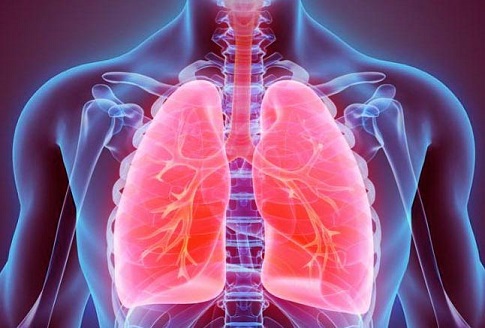Nikhil Prasad Fact checked by:Thailand Medical News Team Aug 18, 2024 1 year, 4 months, 3 days, 8 hours, 40 minutes ago
Medical News: Lung fibrosis, specifically idiopathic pulmonary fibrosis (IPF), is a devastating condition with a bleak prognosis, often leading to progressive respiratory failure. Researchers from the Medical Institute Named after S.I. Georgievsky at V.I. Vernadsky Crimean Federal University in Russia have embarked on a comprehensive study review to uncover the cellular and molecular mechanisms behind lung fibrosis and explore the potential of vitamin D as a therapeutic agent. This
Medical News report delves into their findings, shedding light on how vitamin D might offer a new avenue for treating this challenging disease.
 Vitamin D can help combat lung fibrosis
Understanding Lung Fibrosis: A Silent Threat
Vitamin D can help combat lung fibrosis
Understanding Lung Fibrosis: A Silent Threat
Pulmonary fibrosis is a complex, irreversible scarring of the lung tissue that results in severe respiratory dysfunction. The condition progresses through various stages, beginning with the damage to the alveolar epithelium, followed by an inflammatory response, and culminating in excessive fibrous tissue formation. Despite advances in understanding the disease, treatment options remain limited, with lung transplantation being the only procedure that has shown significant impact on patient survival.
The Russian research team emphasizes the importance of exploring new therapeutic approaches that go beyond current treatments, which include drugs like pirfenidone and nintedanib, known for their limited efficacy in slowing disease progression.
The Cellular and Molecular Basis of Lung Fibrosis
The research team focused on the cellular and molecular mechanisms that drive the development of lung fibrosis. Central to this process is the transforming growth factor-beta (TGF-β) signaling pathway, which plays a pivotal role in fibrosis by promoting the differentiation of fibroblasts into myofibroblasts - cells responsible for collagen production and tissue scarring. This pathway, along with others like the renin-angiotensin system (RAS) and various pro-inflammatory cytokines, orchestrates the complex interplay between different cell types involved in lung fibrosis.
The researchers noted that damage to the alveolar epithelium, particularly to type I and type II alveolocytes, is a key trigger in the onset of fibrosis. The resulting inflammatory response, characterized by the release of cytokines and growth factors, leads to the recruitment and activation of fibroblasts. These cells then transdifferentiate into myofibroblasts, which are central to the pathological remodeling of lung tissue.
Vitamin D: A Potential Game-Changer
Vitamin D, traditionally known for its role in calcium and phosphorus homeostasis, has garnered attention for its non-classical effects, including its ability to modulate the immune response and influence cell proliferation, differentiation, and apoptosis. The Russian researchers explored the possibility that vitamin D, through its receptor (VDR), could be a key player in preventing or mitigating lung fibrosis.
The study reviewed evidence from various in vitro
and in vivo experiments, suggesting that vitamin D and its metabolites can inhibit key signaling pathways involved in fibrosis, such as the TGF-β/SMAD pathway, NF-kB, and MAPK. Additionally, vitamin D appears to suppress the renin-angiotensin system, which is known to contribute to fibrosis by promoting the formation of extracellular matrix components.
Experimental Insights: Vitamin D’s Impact on Lung Cells
The research highlighted several experimental studies that demonstrate the potential of vitamin D in combating lung fibrosis. For instance, in cultures of human alveolar epithelial cells, the addition of vitamin D significantly reduced the expression of TGF-β1, a critical driver of fibrosis. This reduction was accompanied by decreased activation of fibroblasts and myofibroblasts, suggesting that vitamin D could help prevent the excessive deposition of collagen and other extracellular matrix components.
Furthermore, experiments involving animal models of bleomycin-induced lung fibrosis - a commonly used method for studying pulmonary fibrosis - revealed that vitamin D supplementation led to a marked decrease in fibrotic changes. The study found that vitamin D-treated animals showed reduced levels of hydroxyproline (a marker of collagen content) and less severe histopathological damage compared to untreated controls.
Clinical Implications: The Future of Vitamin D in Fibrosis Treatment
While preclinical studies offer promising insights into the potential of vitamin D as an antifibrotic agent, clinical evidence remains limited and inconclusive. Some studies suggest that vitamin D deficiency may be linked to an increased risk of developing pulmonary fibrosis, while others fail to establish a clear connection.
The Russian researchers emphasized the need for more rigorous clinical trials to evaluate the efficacy of vitamin D and its analogs in patients with lung fibrosis.
One challenge in translating these findings into clinical practice is the variability in individual responses to vitamin D supplementation. Factors such as genetic polymorphisms, epigenetic modifications, and differences in vitamin D metabolism may influence how patients respond to treatment. Despite these challenges, the researchers believe that vitamin D holds promise as a therapeutic option, particularly when combined with other treatments that target different aspects of the disease.
Conclusion
The study review provides a comprehensive overview of the potential role of vitamin D in treating lung fibrosis. By modulating key signaling pathways and influencing the behavior of various cell types involved in fibrosis, vitamin D could offer a new therapeutic approach for patients with this debilitating disease.
However, the journey from experimental findings to clinical application is fraught with challenges. The inconsistency in clinical trial results highlights the need for further research to fully understand the mechanisms by which vitamin D exerts its effects and to identify which patient populations are most likely to benefit from this treatment.
The study findings were published in the peer-reviewed International Journal of Molecular Sciences.
https://www.mdpi.com/1422-0067/25/16/8946
For the latest on Lung Fibrosis, keep on logging to Thailand
Medical News.
Read Also:
https://www.thailandmedical.news/news/pirfenidone-brings-hope-for-fibrotic-interstitial-lung-diseases
https://www.thailandmedical.news/news/the-uniqueness-of-post-covid-lung-fibrosis-the-increased-expression-of-atp12a-protein
https://www.thailandmedical.news/news/long-term-lung-healing-even-after-mild-or-moderate-covid-19-many-could-develop-lung-fibrosis
https://www.thailandmedical.news/news/vitamin-e-can-help-with-lung-fibrosis
